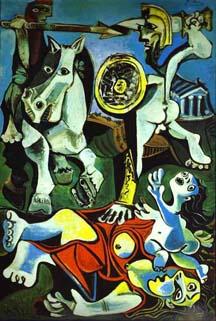November 1, 2012

Rape of the Sabine Women (1963) by Pablo Picasso is currently on display at the JFK Library.
The most famous and most valuable painting ever to visit Dorchester is currently on display at the JFK Library and Museum. The Museum of Fine Arts, Boston, has loaned the larger-than-life-size Pablo Picasso canvas “Rape of the Sabine Women” (1963) to the Columbia Point landmark through Jan. 6, 2013.
This multimillion dollar masterwork, created shortly after the 13-day Cuban missile crisis of 1962, is on display to commemorate the 50th anniversary of President Kennedy’s announcement of a blockade of Soviet vessels upon the discovery of Russian missiles with nuclear warheads in Cuba.
When Caroline Kennedy, president of the JFK Library Foundation, unveiled the canvas on Oct. 5, she called the period her father’s “greatest challenge.”
“The Cuban missile crisis was really the most dangerous time in my father’s presidency, and there really was a risk that the United States and the Soviet Union might go to war,” she said. “I think there’s a lot that current leaders can learn from [it].”
MFA Director Malcolm Rogers added, “President and Mrs. Kennedy were champions of the arts, and we are honored to lend Picasso’s powerful masterpiece inspired by the Cuban Missile Crisis—one of the great treasures of our collection—in remembrance of this pivotal moment in our nation’s history.”
The painting, a 6-foot-by-4-foot vertical oil on canvas, depicts in bold colors two armed men, with spear and sword raised toward each other, riding roughshod over a mother and her wailing child.
Inspired by works in the Louvre Museum by Nicolas Poussin and Jacques-Louis David, the 82-year-old Spanish artist produced a series of four pictures on this theme: three small oils in late 1962 and the monumental 77-by-52 inch canvas (now owned by the MFA) in early 1963.
Picasso references a favorite theme from ancient Roman history. According to legend, when Rome was first established, it faced a shortage of marriageable women. Romulus the founder of Rome, and his men invited a nearby warlike tribe, the Sabines, to a feast only to capture all the Sabine virgins and take them as wives. Years later, the Sabine forces, led by Titus Tatius, attempted to take back their sisters and daughters by force, but the women intervened and brokered a truce, reminding the Sabine men that the Romans were now their sons and brothers by marriage. Even Hersilia, daughter of Titus Tatius, had borne Romulus a child.
Villages:
Topics:


